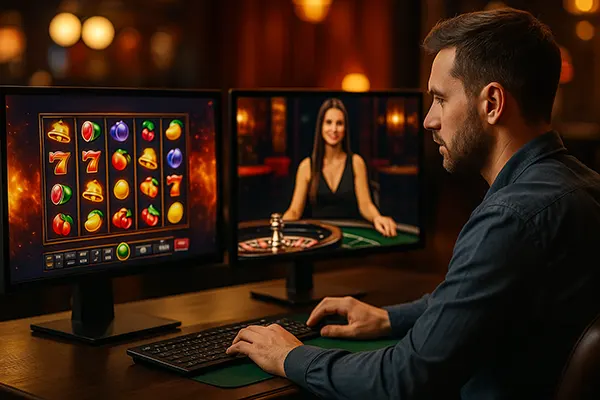
Comparison of RNG and Live Dealers: What Is Truly Fairer
In 2025, online gambling continues to grow rapidly, and fairness remains a key factor when choosing between RNG-based games and live dealer tables. Both formats offer different experiences and levels of transparency, and understanding how they work is essential for any player who values trust and control over the gaming process.
Understanding the Role of RNG in Modern Casino Games
Random Number Generator (RNG) technology is the core of digital gaming fairness. It ensures that every outcome in a slot, blackjack, or roulette game is completely random and independent of previous results. Certified laboratories such as eCOGRA, iTech Labs, and GLI regularly test and verify these systems to guarantee transparency and randomness in every spin or card draw.
By 2025, most licensed online casinos use advanced RNG algorithms that operate with cryptographically secure sequences. These algorithms simulate real-life probability with mathematical precision, removing any potential bias. The software is subject to strict regulation by authorities such as the Malta Gaming Authority (MGA) and the UK Gambling Commission.
RNG technology provides convenience and accessibility. Players can enjoy instant results, flexible betting limits, and various game themes without waiting for real-time interaction. However, despite its efficiency, some users remain sceptical, believing that software-based systems may be manipulated, even when audited by reputable organisations.
Transparency and Certification in RNG Testing
Every licensed operator must provide visible proof of RNG testing. Independent auditors publish certificates confirming compliance with fairness standards and return-to-player (RTP) percentages. These documents are often available on the website footer or within the game information section.
For example, games developed by companies like NetEnt, Play’n GO, and Microgaming undergo regular verification to maintain credibility. The certification process includes simulation of thousands of game rounds to analyse statistical deviations and ensure that results follow the expected probability curve.
Still, players are encouraged to check the latest audits or seek casinos with transparent verification records. The fairness of RNG games depends not only on technology but also on the operator’s responsibility to maintain ethical practices and public trust.
Live Dealers and the Rise of Real-Time Authenticity
Live dealer games bridge the gap between traditional and digital gambling. Instead of relying on algorithms, outcomes are determined by real cards, roulette wheels, and dice streamed from professional studios. Providers like Evolution, Pragmatic Play Live, and Playtech Live have redefined the industry with high-definition broadcasts and advanced camera angles.
Unlike RNG games, live dealer sessions are managed by human croupiers who follow real casino rules. Players can interact through chat, creating a sense of transparency and community. Each session is recorded, and physical randomness replaces mathematical algorithms, giving participants visible control over the process.
In 2025, the global adoption of 5G and low-latency streaming technologies has made live dealer games more stable and immersive. Studios located in Malta, Latvia, and the Philippines now host tables 24/7, offering regional languages, multiple currencies, and responsible gaming features to ensure fairness and compliance.
How Live Dealer Systems Ensure Fairness
Live dealer operators rely on real-time supervision and external auditing. Cameras track every movement, and all outcomes are digitally recorded for post-game verification. Additionally, the equipment used — such as roulette wheels and card decks — is periodically inspected by certified gaming authorities.
Software providers integrate secure data encryption and anti-fraud systems to prevent interference. Each dealer undergoes professional training and is monitored to guarantee adherence to fair play policies. This approach makes live dealer experiences nearly impossible to manipulate without immediate detection.
Nonetheless, fairness in live games also depends on the player’s connection quality and chosen operator. Reputable casinos ensure that any potential delays or disconnections are managed transparently and do not affect the result of a round.

Which Format Is Truly Fairer in 2025?
Determining fairness depends on one’s definition of transparency and control. RNG games offer mathematically proven randomness and accessibility, while live dealer tables provide visible physical fairness. Both formats have evolved under strict regulation, ensuring integrity for players worldwide.
In practice, certified RNG systems are as reliable as live games, though they lack the visual proof that human interaction provides. Modern audit standards, combined with cryptographic security, make manipulation practically impossible under licensed operations.
Therefore, the choice between RNG and live dealers is not about fairness but about trust preference. Some players value analytical assurance through certification, while others prefer the human element that comes with a live experience. In 2025, both options stand as equally fair, provided the operator holds valid licences and complies with transparency standards.
Choosing Safe and Verified Casinos
To ensure fair play, users should always check the casino’s licence and audit reports. Platforms regulated by the MGA, UKGC, or Danish Gambling Authority offer clear information about game providers and fairness verification.
Players should also confirm that the game providers listed, such as Evolution, NetEnt, or Pragmatic Play, are certified and use third-party auditing systems. Transparent information about RTP rates and testing agencies signals reliability.
Finally, responsible gambling tools — such as deposit limits, session reminders, and self-exclusion options — complement fairness by protecting users from risk. In the modern era, fairness is not only about random outcomes but also about ethical and sustainable gaming practices.
